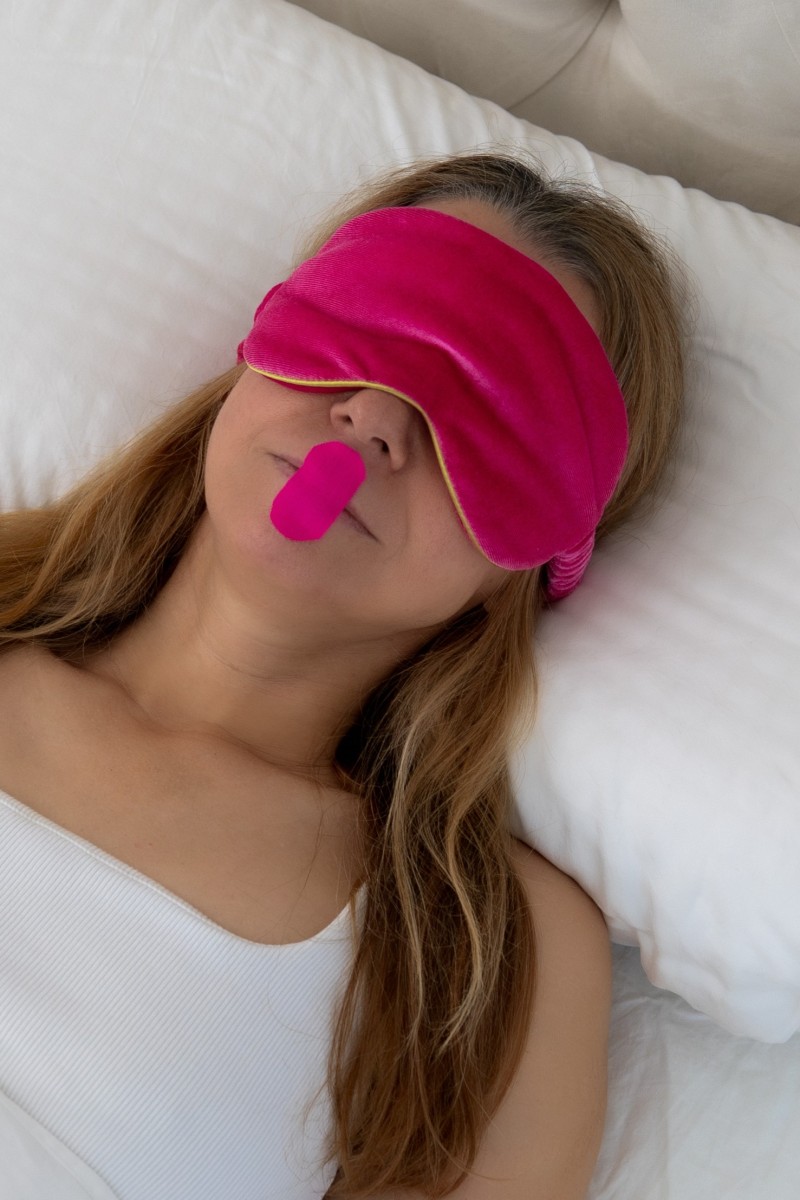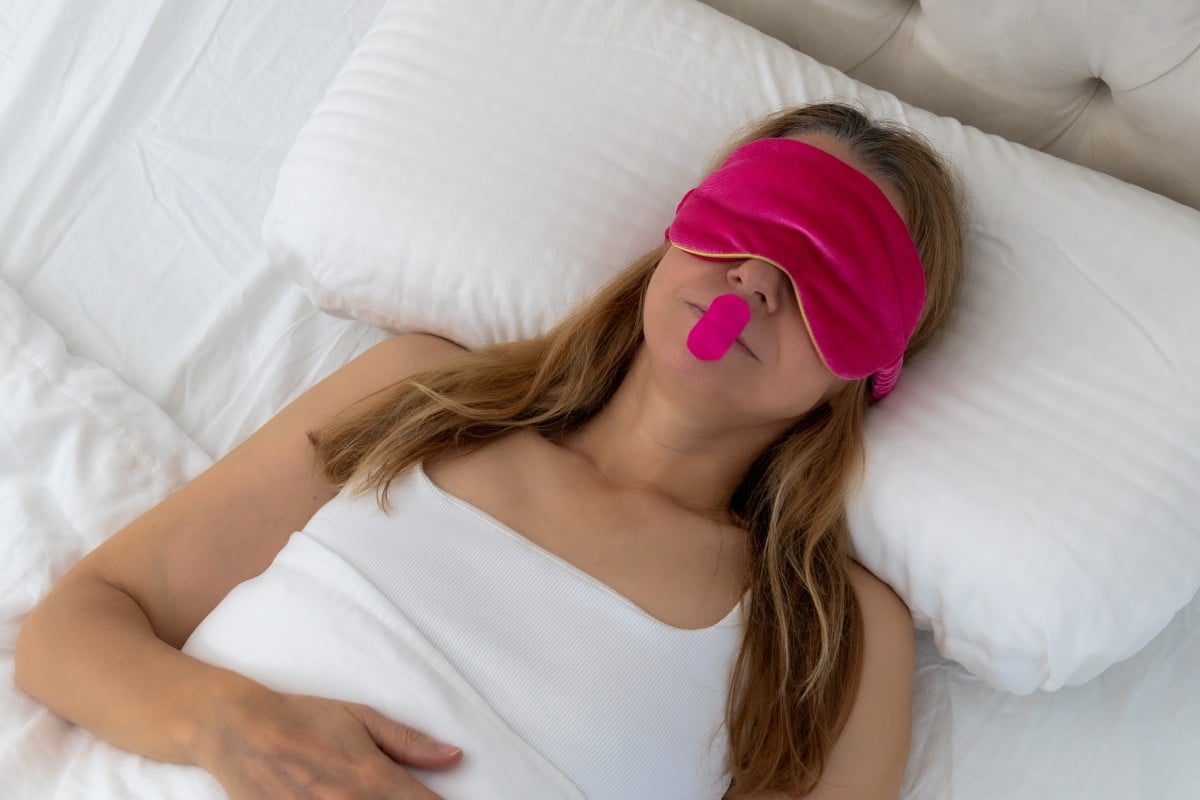
Listen Up: Is mouth taping the answer to your sleep prayers?
Practise your English with our short listening exercises: play the audio, answer the questions, and check the answers at the bottom of the page.
 Mouth taping, a social media trend, claims to improve sleep and reduce snoring by promoting nose breathing, but lacks scientific backing. Photo: Shutterstock
Mouth taping, a social media trend, claims to improve sleep and reduce snoring by promoting nose breathing, but lacks scientific backing. Photo: Shutterstock Questions
1. According to the podcast, what is the purpose of mouth taping?
A. to prevent sleepwalking
B. to cure insomnia
C. to improve skin health
D. none of the above
2. What does sticking tape to one’s mouth during sleep do?
A. It helps them to breathe more slowly.
B. It stops them from grinding their teeth.
C. It forces them to breathe through their nose.
D. It helps them to lower blood pressure.
3. If a claim is “unsubstantiated”, it …
A. is widely accepted as accurate.
B. is not supported by evidence.
C. is scientifically proven.
D. is considered somewhat reliable.
4. Some people believe mouth taping can improve their appearance by ...
A. reducing face wrinkles.
B. making their lips plumper.
C. making their jaw bigger.
D. enlarging their eyes.
5. According to the Sleep Foundation, who might benefit from mouth taping?
A. people who suffer from jet lag
B. people who experience panic during sleep
C. people who snore and have mild sleep apnoea
D. people who have an uncomfortable feeling in their legs that makes it hard to sleep
6. Which of the following is not mentioned in the podcast as a proven benefit of nose breathing?
A. filtering out allergens
B. delivering warmer air to the lungs
C. increasing lung volume
D. improving sleep quality
7. What does the “condition” in the podcast refer to?
A. issues focusing
B. snoring
C. anxiety
D. sleep apnoea
8. Which phrase can replace “sit this trend out” in the podcast?
A. embrace this trend
B. avoid this trend
C. learn about this trend
D. experiment with this trend
9. What does the podcast suggest people use if they want to try this trend?
A. test strips
B. surgical tape
C. paper tape
D. porous strips made for skin
10. Who is the target audience for this podcast?
A. researchers who are studying sleep apnoea
B. people who follow health and wellness trends on social media
C. companies that produce tape
D. none of the above
11. Which of the following side effects of mouth taping are mentioned in the podcast? Tick the correct answers. (4 marks)
-
It can make it difficult to breathe.
-
It can deliver cooler air to the lungs.
-
It can mess up your sleep.
-
It can help fix a deviated septum.
-
It can make your breath smell bad.
-
It can irritate your lips.
-
It can cause you to feel anxious.
Answers
1. D
2. C
3. B
4. A
5. C
6. D
7. D
8. B
9. D
10. B
11. It can make it difficult to breathe. / It can mess up your sleep. / It can irritate your lips. / It can cause you to feel anxious.
Script
Adapted from Tribune News Service
Voice 1: It feels like every month, there is a new tip that social media says will change your life. The newest “hack”, mouth taping, is said to improve respiratory and oral health. It is also meant to reduce the risk of obstructive sleep apnoea, a condition that causes abnormal breathing during sleep.
Voice 2: The trend is just what it sounds like – advising people to stick any household tape to their mouth before bed. They are then forced to breathe through their nose, reducing many of the supposed risks of mouth breathing all night.
Voice 1: Supporters of mouth taping say it eases snoring, fatigue, bad breath, excessive thirst and concentration issues. However, none of these claims have been scientifically studied. Others claim mouth taping has a cosmetic benefit, reducing face wrinkles and creating a sharp jawline. These claims also are unsubstantiated.
Voice 2: According to the Sleep Foundation, mouth taping can be beneficial in reducing snoring, particularly for people with mild sleep apnoea. However, researchers have not seen the practice affect the snoring of people without the condition. Although the benefits of mouth taping have been disputed, the benefits of nose breathing are widely reported. The Sleep Foundation said nose breathing could add resistance that benefits lung volume, filters out allergens and delivers warmer air to the lungs.
Voice 1: If you snore even though you have an easy time breathing through your nose, mouth-taping might work for you. However, if you suffer from allergies, a deviated septum, congestion or other breathing-related health issues, it might be wise to sit this trend out.
Voice 2: There are some side effects you should watch out for. According to the Sleep Foundation, mouth taping can cause disrupted sleep, anxiety, discomfort or difficulty breathing, and irritation around the lips.
Voice 1: You should talk to your doctor before using mouth tape, particularly if you worry you may have some form of sleep apnoea. If you decide to use mouth tape, many companies sell porous strips intended for human skin that are much safer than using a regular piece of tape.